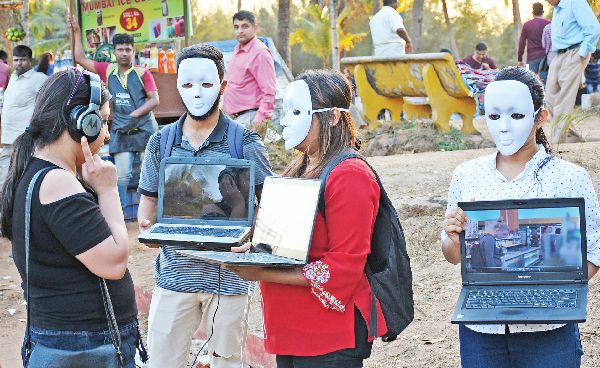The Vegan India Movement is a pan-India awareness campaign focusing on the ethical, environmental and health impacts of using animals for food, clothing, entertainment, experimentation, etc. And Goa has joined in too

A few days ago, a curious sight caught the attention of visitors at Miramar Beach. A bunch of people wearing masks stood motionless holding up signs and laptops playing videos of actual footage from inside Indian slaughterhouses, hatcheries and dairy farms. As onlookers stepped closer for a better look, they were given a class on the cruelty metted out towards animals used for purpose of food, fashion, research and were encouraged on how to make kinder choices.
The activity was part of the Earthlings Experience, an awareness demo by the newly formed Goa Chapter of the Vegan India Movement which began in January this year across 30 cities and is slowly sweeping the country.
“In 2017, there were a lot of positive developments happening globally with regards to animal rights. For instance, some forms of animal entertainment were banned and the government also started investing in alternatives to animal testing. We wanted to capitalise on these positive gains,” says Advocate Gemini Xettigar, who is part of the Goa team. “While volunteers all over India have been trying to create awareness about stopping cruelty towards animals individually, we decided that we needed to bring it to the consciousness of people at large to create awareness. And hence grassroot activists have come together on a common base leading to the birth of the Vegan India movement.”
As part of this movement, the Goa team which consists of 20 members will be conducting two events– an awareness raising activity like a video outreach where people are shown what happens in dairy farms, slaughter houses etc and a potluck where a picnic consisting only of vegan food is organised.
“Very few people know what actually happens in slaughterhouses etc. We also tell them of the alternatives available and how everyone can make a difference without relying on government action,” says Xettigar.
The most common question they get asked relates to health issues, she says. “Growing up we are told that we need to drink animal milk to build strong bones. But medical research has proven that this is not true. Animals make milk tailor made for the nutrient requirements of their own infants only and their milk is not healthy for humans,” she states, adding that humans don’t need to eat meat to thrive and be healthy. And while it may be argued that the proteins acquired from animal meat will be missing if people stop eating this, Xettigar states that there has been plenty of research which states that by eating a well planned plant based diet, all the necessary protein requirements will be met.
As per the growing number of vegans, numerous international nutritional organisations, including the American Dietetic Association have certified that vegan diets are healthful, nutritionally adequate, and may provide health benefits in the prevention and treatment of certain diseases. They state that the World Health Organisation has also classified processed meat as a Group 1 carcinogen, alongside tobacco smoking and asbestos.
And while arguments have also been made that eating some animal meats is part of certain religions, Xettigar believes that this needs to change. “We believe that just as humans are evolving, religions too should evolve with time. And there have been social reforms with regards to other issues concerning religion in the past too,” she says. “What needs to be remembered is that veganism is not confined to any one religion. People from all religions are a part of this movement. Veganism rises above religious barriers, creed or nationality.” Besides, she says, there have been cases of animal exploitation in the name of religion too, for instance temple elephants, which the movement opposes.
Questions about interfering with individual choice also are ill founded, she states. “When there is a victim involved, individual choice does not find place. For instance a serial killer may say it is his choice to kill a person for whatever reason. But this does not hold ethical justification. Here, the victim is the animal. and individual choice takes a backseat,” she says.
Xettigar also reiterates that they are not targeting any individual or profession. So while stopping of animal slaughter for different purposes could affect the livelihood of people involved in this line, she says that other avenues will open up. “As the demand for vegan grows, farmers and companies have come together to come up with alternatives to milk, dairy and animal based food. So new avenues will open up and humans adapt with time,” she says.
Another point often raised is that if animals are to be left alone, there could be an explosion of animal population in the future. But Xettigar disagrees. “Right now to meet the demand, the number of animals are being expanded through artificial insemination and other procedures. But otherwise animals do not breed more than what nature can handle,” she says. And while she agrees that vegetables and agricultural produce too are being treated chemically to meet the growing demand, she states that this is just a dot as compared to how many animals are mistreated. “Besides with vegetables, you have the choice of opting for organic produce,” she says.
The team knows however that changing the attitudes of people will take time. “All social justice movements take time. If we look back in history there was a time when slavery was legal and when we think about it we wonder how this could have even been now. So as we evolve, our circle of compassion should expand to include liberation of animals from all kinds of torture and abuse,” she says.